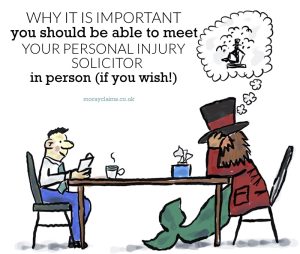Our blog shares clear, practical guidance on personal injury claims in Scotland — including fault, compensation, timescales, and dealing with insurers. Many of the articles answer questions we’re regularly asked by people who are unsure whether to claim, are dealing directly with insurers, or want to understand their rights before deciding what to do next. Start here: key guides Popular questions Common situations Back to the main blog page Editor’s note: This guide stays at the top of the list of blog posts to help new readers find key information. Continue Reading
Why it is key that it is no problem to see your PI solicitor in person (if you want to see them in person!)
If you have had an accident and you live in Moray, it should be easy to have a face-to-face meeting with your solicitor, if you wish. (i.e. It's key that you won’t have any difficulty having a face-to-face meeting with your solicitor if you want to meet with them face-to-face). Since the Pandemic of the early 2020s, as well as the possibility of exchanging information with your solicitor by letter or email or having a ‘meeting’ with them by telephone, there are many available options which do not require you to the physical presence of your solicitor – e.g. online video platforms. such as Zoom or Teams. Is it crucial to meet with your solicitor face-to-face? It's probably not crucial. However, we know from experience that even meeting via online video does not give us all the verbal and non-verbal cues which we get if we are in the personal presence of the person to whom we are speaking. An in-person meeting is probably always better because there is less chance of Continue Reading
When English insurers refuse to apply Scots Law to a Scottish personal injury claim
Rugby League and Rugby Union have common origins. There are many similarities between the two codes. Both kinds of rugby use an oval ball and play on a rectangular pitch with H-shaped goals. Each plays two halves of 40 minutes. Passes must always go backwards. Tackling is a crucial element in each. But there are significant differences as well. There are 15 players in a Rugby Union team and 13 players in a Rugby League team. There are no lineouts in Rugby League. If a ruck or maul develops in Rugby Union there is a material chance that possession will change hands whereas in Rugby League possession is generally retained by the team which previously had possession – up to the point of the ‘sixth tackle’ when possession will automatically change hands according to the rules of Rugby League. There are some who say that Rugby Union is played at a slower pace - with more stoppages - whereas Rugby League maintains a generally higher pace of play, with higher ball-in-play Continue Reading
E-Scooter and E-Bike Accidents in Scotland – Your rights to claim for injury
Have you tried out or do you own an e-Bike or e-Scooter? The streets of some parts of Scotland have been transformed by the surge in popularity of e-bikes and e-scooters. While these devices offer a convenient and often eco-friendly mode of transport, their rapid adoption has created a complex legal landscape for those involved in accidents. Misinformation about the legal position of riders is widespread and this article aims to clarify the current legal position in Scotland for potential victims of accidents involving e-bikes, e-scooters, and their variants. We will include a discussion of the factors affecting the viability of a personal injury claim where one of these vehicles is involved. Understanding the legal standing of the vehicle involved is the first crucial step in assessing the viability of a claim. The law differentiates significantly between various types of electrically powered personal transport. The Different Classes of Electric Personal Continue Reading

